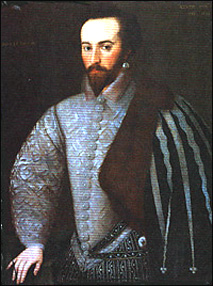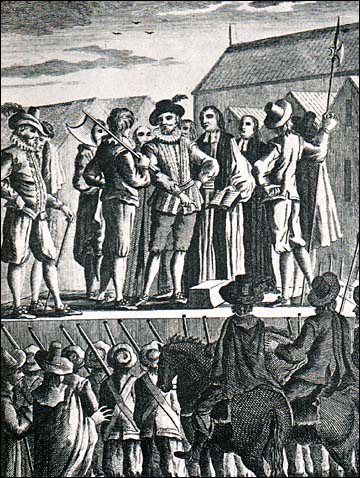 His
life
His
lifeSir Walter Raleigh
His Life and
His Works
[home]
Sir Walter Ralegh was a great soldier, sailor, explorer, pioneer, and courtier, as well as an interesting and intriguing writer. He shared much in common with his fellow contemporaries, such as Spenser (who he actually introduced to the court and was the cause for Spenser’s pension for his Faery Queen), Sidney, and Marlowe. Although he wasn’t as talented as any of these writers, it is precisely his struggle with the forces of Elizabethan romanticism that is fascinating. As Brooke explains in his book, “Ralegh’s imagination destroyed nearly as much as it created” (121).
Ralegh was the youngest son of Devon family which may or may not have had royal blood. However, any money that had been in the family was no longer there when Ralegh was born. His father was remarried three times, Ralegh being the son of the third wife, who was widowed and had two sons of her own, Humphrey and Adrian Gilbert.
Ralegh spent the first thirty years of his life
on the sea or on land fighting. He joined his mother’s nephew, Henry
Champernoun, to fight with the Huguenots in France against the Catholics (he
himself was a Protestant). He also may or may not have fought with his
half-brother, Humphrey, against the Spaniards in the Netherlands. However,
after ten years of
fighting, he decided to join the court scene.
When Ralegh started frequenting the court, he soon became a favorite of Queen Elizabeth’s, replacing Sir Philip Sidney, who died in battle in a skirmish at Zutphen, when sending troops into the Netherlands. Ralegh, who was hated by most, except for the Queen, was made Captain of the Guard, knighted, given estates in Ireland (that were forfeited by Desmond rebellion), and estates in England (that were forfeited by conspirators in Babington’s plot). In addition to making connections in the court, Ralegh was interested in the exploration of North America. He was truly the “father of English Colonial Empire which today has developed into the British Commonwealth of Nations” (Innes 147).
However, eventually Ralegh was imprisoned in the Tower for a while for assumedly illegitimately sleeping with one of Queen Elizabeth’s maids of honor, Bess Throckmorton (although it is typically assumed that the two were married). He was released from the Tower when Martin Frobisher returned from the private raid of the Spanish commerce, which was Ralegh’s idea, and needed to entrust the loot to someone the sailors respected.
Ralegh was then executed on October 29, 1618, after fourteen years of imprisonment in the Tower. This time he was charged for having “sold England to the Spaniards” (Innes 159). The English popular opinion was that Ralegh was only executed as a sick appeasement of the Spanish forces, the new allies of the English. And when he was executed, the English believed that “We have not such another head to be cut off” (Innes 162).
Sir Walter Ralegh was a renaissance man. He delved into each area of life, maintaining his position as a frequent visitor of the Mermaid Tavern, mingling among other great literary minds. As Innes eloquently puts it, Ralegh "lives as the supreme type of what we mean by the Elizabethan spirit, its tremendous energy, its daring and self-reliance, its fiery impulsiveness, its intense enjoyment of life, its curious combination of hardness with generosity and of practicality with idealism” (162).
 His Works (back
to top)
His Works (back
to top)
Poetry
- "The
Passionate man's pilgrimage"
- "Epitaph upon Sir
Philip Sidney"
- "A farewell to false Love"
Prose
- "The
History of the World"
- "The
Discovery of Guiana"